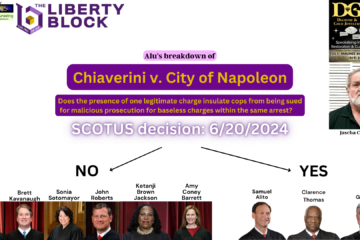By Representative Len Turcotte for The Liberty Block
There is a bill currently making its way through the legislative process in our state that should be of great concern to NH’s fiscally responsible and liberty-minded citizens.
HB628 (Family Medical Leave Insurance) would implement a bureaucratic social scheme above and beyond the federal program that already exists. There are four main points to consider as we discuss:
1) Family Leave insurance plans currently exist in the private marketplace and are readily available to employers and employees desiring them.
2) As originally introduced, this bill would have created a new 0.5% tax on income disguised as a “premium”; and as amended, it creates another financially unsustainable social program that will likely require a taxpayer bailout in short order.
3) At its peak, the program requires the addition of 45 new State Employees at an annual cost of 4.1 million dollars, or the equivalent of almost $100,000 per added employee; and it will take nearly 16,000 private-sector employees opting into the scheme just to cover the administration costs.
4) The bill is not needed, it adds further bureaucracy, it is ill-thought out, and contains multiple, glaring deficiencies.
A brief history on why we are even looking at an FMLI scheme to begin with: The NH Department of Employment Security (under a Democratic Governor) requested a financial grant from the US Department of Labor (under a Democratic President). The grant of nearly $200,000 was approved and distributed to the University of NH’s Carsey Institute and the Institute for Women’s Policy Research (IWPR). Consider that liberal democrat chain of events.
When this bill was first introduced, it mandated a 0.5% tax on wages of every single private sector employee in our state, with the exception of government employees. Having realized that a blatant income tax would be a very difficult sell to the legislature, an amendment was added to make the tax “optional” in an attempt to have the scheme appear less extreme. Unfortunately, in doing so, the amendment creates even more problems than the original bill contained.
Currently, only four states in the country have FML insurance schemes in place. In each of those states, however, and this is very important to understand, the plans were implemented as a mandate on every employee in those states and not as an “Opt-out, Opt-in” system for only private-sector employees as the amended bill proposes.
Two of the individuals contracted to assess this scheme provided lengthy oral and written testimony to our Labor Committee. Read the quotes from their testimonies very carefully.
Kristen Smith of University of New Hampshire’s Carsey Institute stated in her written testimony to the Labor Committee: “Opt-ins makes programs unsustainable”, and, “opt-in opt-out is unchartered territory”. Recall that not one of the four states who currently have individual state FML insurance plans have opt-outs.
Why?
Because plans without a 100% mandate are unsustainable.
Testimony was also advanced regarding plans without 100% mandatory participation by Jeffery Hayes, PhD form the Institute for Women’s Policy Research, the individual who did some of the actuarial research. Mr. Hayes points out: “As costs climb for smaller participant pools with higher benefits, more workers may withdraw or cease to participate in ways we have not yet been able to measure or estimate, which would result in an unsustainable program.”
There is that word again: Unsustainable.
Now, realize that all the actuarial simulations and number-crunching the sponsors of this bill are based upon 100% mandatory participation and contributions from every state and local government employee, every private-sector employee and every self-employed person in the state. Those continuing to push forward the amended bill have either failed to read and understand their own paid “experts”, or are simply moving forward on ideology alone.
Let’s look at a few of the other deficiencies in the bill. The bill contains language on “retaliation” that guarantees an increase in lawsuits and the costs associated with pursuing or defending those lawsuits. The bill mentions fraud by claimants. That will certainly require additional bureaucratic time, effort and costs to ensure compliance as well as additional employees above and beyond the numbers already estimated to implement.
My personal favorite is that government employees are exempted. Why are they exempted? I believe it to be the case that several public-sector unions would attempt to have taxpayers pick up the costs of this scheme by getting it in their contracts. Or maybe is it that some legislators are OK with using our private-sector employers and employees as social and financial lab-rats, but do not want to take any heat from public employees for the same experimentation.
Continuing with the list of deficiencies, what happens when, not if, the program becomes underfunded and eventually insolvent? Will NH taxpayers then be forced to pick up the additional costs? Will those in the program be required to pay ever-increasing amounts toward the scheme, which is what happened in the case of Obamacare? My fear is that the sponsors and those who support this bill are expecting future legislatures to step in and clean up the mess later on.
The plan also creates a situation allowing for financially strategic manipulation by employees by waiting to opt-in when they anticipate needing or wanting the paid time off. A planned pregnancy, with its known timeline demonstrates this possibility. In the case of a pre-planned pregnancy, an employee could opt out of the system initially. With proper planning, the employee could then opt-in and pay a mere $240 into the system, while removing $5000 in benefits later on. Once again, analogous to what we have seen happen with Obamacare.
Finally, and slightly off of the main subject, but certainly relevant, look at the four states that currently have an FML insurance plans in place: California, New Jersey, New York and Rhode Island. These four states are not exactly places that one would say are in NH’s league when it comes to financial responsibility. In fact, these four states are some of the most financially mismanaged states in our country, fiscal basket-cases if you will. High taxes, extreme debt and severely underfunded pension plans are their norm. They also have some the highest net negative population flows out of their states in the country (two of them rank first and second in net negative migration) as businesses and individuals flee high taxes and burdensome regulations.
During testimony before our Labor Committee and on the House floor, much was made about the poll claiming that 80% of NH citizens support an FML insurance scheme. Much like the individuals, bureaucrats and groups behind this entire scheme, the devil is always in the details. Realize that less than 500 NH residents out of a population of 1.3 million were polled by UNH. Additionally, here is the actual text of the questions asked:
“Some states currently have paid family and medical leave programs that provide a portion of wages to workers who have to take leave from work for personal or family reasons, like to care for a new child, pregnancy, their own serious illness, or a seriously ill family member. Generally, would you support or oppose a paid family and medical leave law in New Hampshire that provides paid leave for the types of situations just mentioned?”
With a polling question worded to obtain a specific, beneficial response as this one did, I find it hard to believe that 100% of the people polled did not answer yes!
As mentioned in the beginning of this article, a final note to drive home the simplest and most common-sense argument against the implementation of this bureaucratic social scheme. In the footnote of this bill, The NH Insurance Department states:
“Insurance plans currently exist that would provide coverage for the types of benefits included in this legislation. The coverage is sold, on a voluntary basis, to employers who desire to provide these benefits to their employees”.
In closing, this bill is not needed or warranted. Recall the infamous words of a California US Representative regarding the vote on Obamacare: “But we have to pass the bill so that you can find out what is in it.” We do not have to do the same here. With a little thought and analysis, we have everything we need right in front of us to know this is another unnecessary social scheme and financial disaster in the making.


